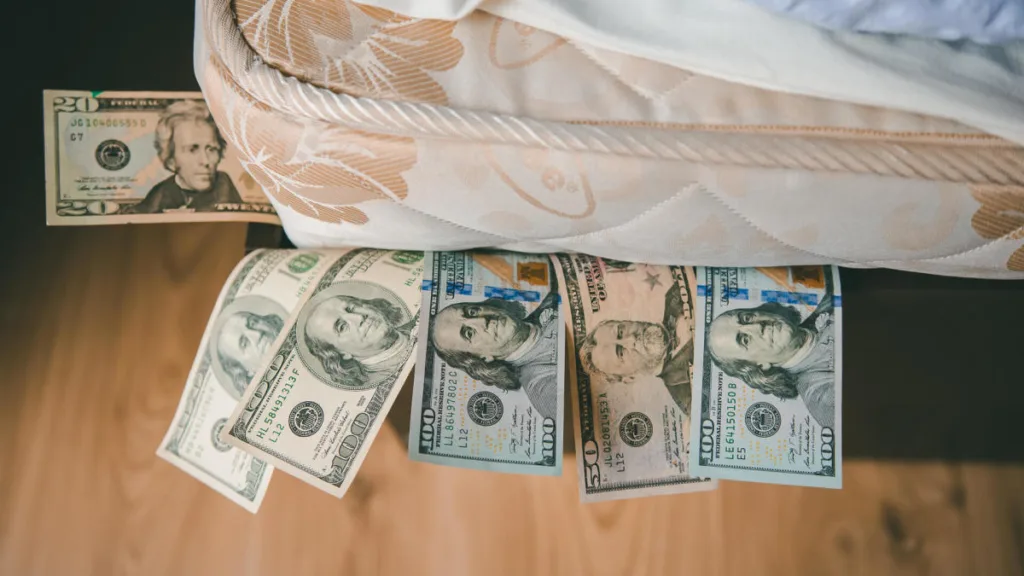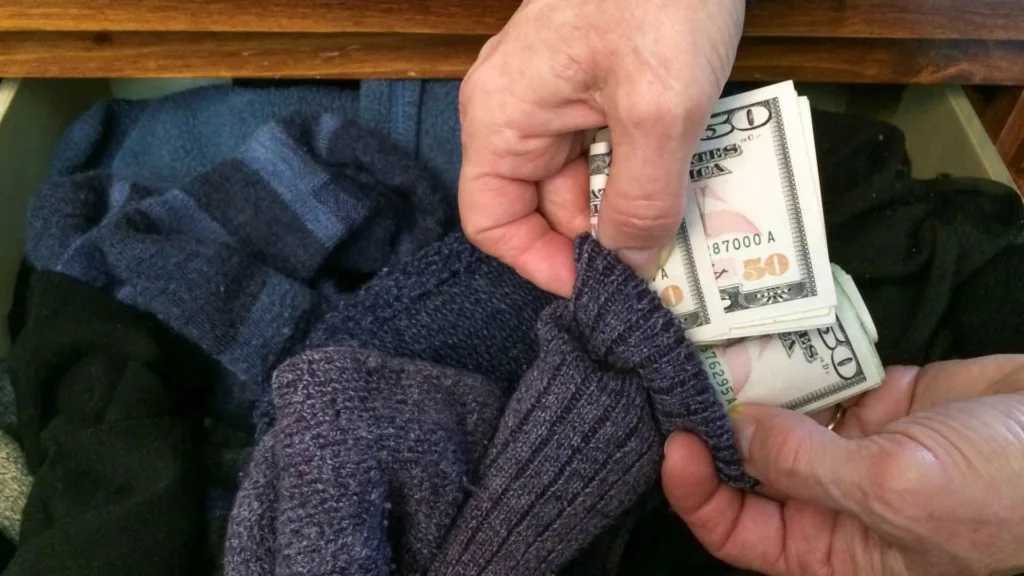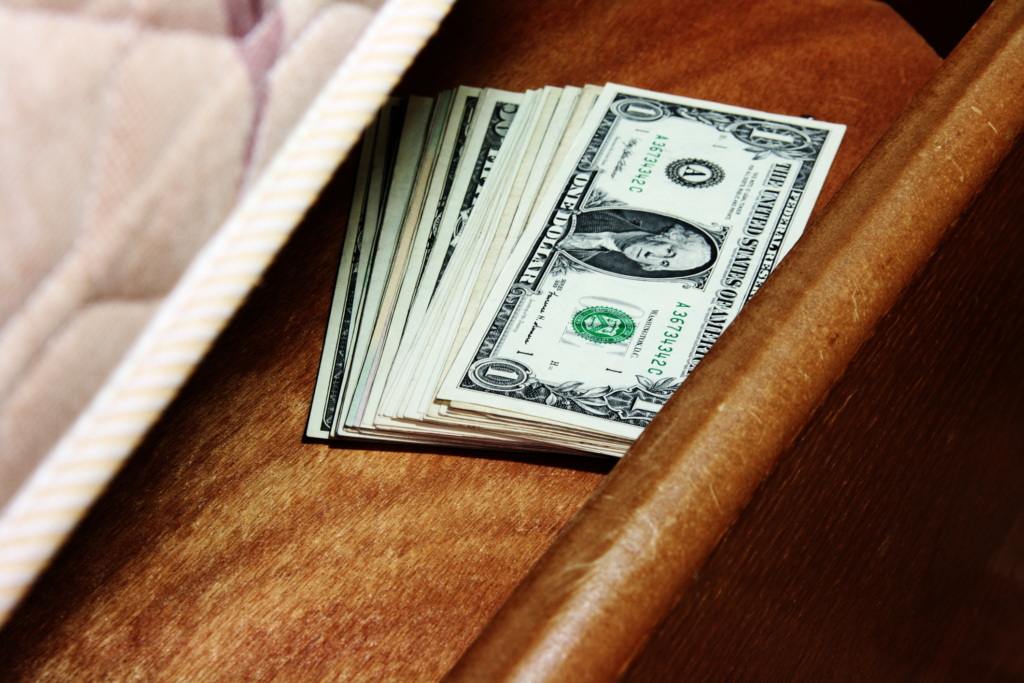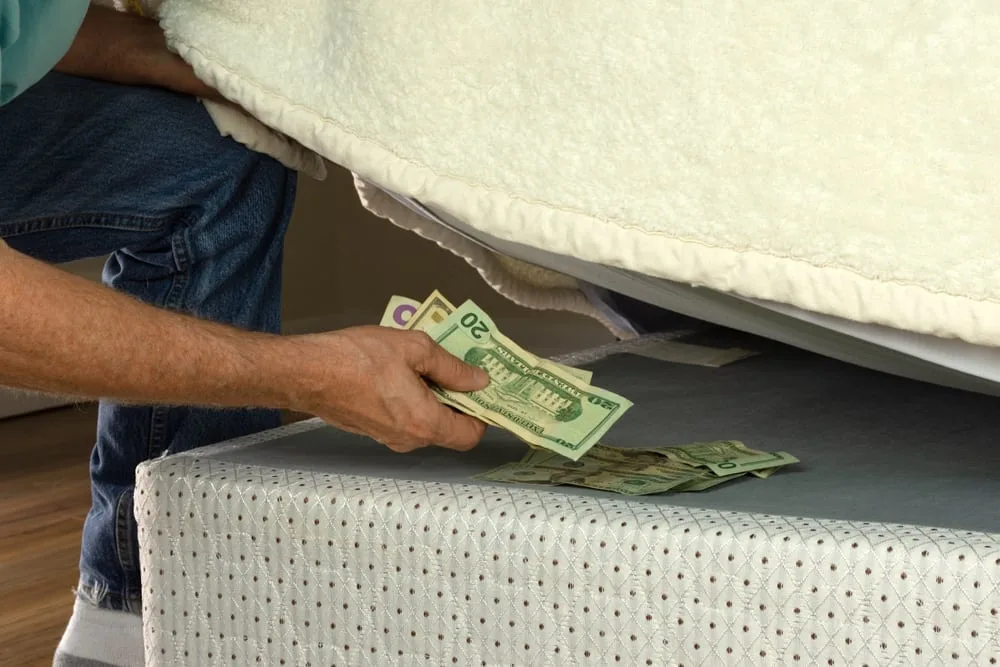In today’s digital age, it’s increasingly rare to find people keeping physical cash at home. However, this age-old practice still holds relevance for various reasons. Local markets, quaint shops, and nostalgic state fairs often operate on a cash-only basis. Some businesses accepting cards may impose minimum spending requirements or levy additional charges for electronic transactions. Furthermore, having a stash of cash can be a lifeline during emergencies, especially when traditional banking services are inaccessible.
But the pressing question remains: How much cash is the right amount to keep at home? Let’s delve into this matter further.

Understanding Cash Stash Trends
A recent survey, encompassing 1,141 American adults, has shed light on the diverse attitudes towards cash management. Astonishingly, almost a quarter of respondents (23.93%) considered their homes to be the safest repository for their finances. However, the amount of cash they chose to hold displayed significant variation:
Read Out:- 30 Side Hustle Ideas To Diversify Your Income 2023. It will Boost the Confidence
- Approximately 36% had a modest sum of $100 or less in cash at home.
- Close to 31% kept between $101 and $500.
- Just over 7% had a more substantial stash ranging from $501 to $1,000.
- Remarkably, nearly 10% opted for a more substantial cash reserve exceeding $1,000.
- Conversely, around 17% of those surveyed preferred a completely cashless approach, with no cash kept at home.
Exploring Cash Management Strategies
Option 1: Cashless Living
Financial experts advocate for a cashless lifestyle. They propose setting up automatic bill payments and relying on credit cards for everyday purchases. With the advent of convenient contactless payment methods, this approach has become increasingly feasible, simplifying financial management.

Option 2: A Modest Cash Reserve
For those who prefer maintaining a financial safety net, keeping a few hundred pounds in cash at home is a prudent choice. This reserve ensures you are prepared for unexpected emergencies while also ensuring that ample funds remain accessible in your bank account to meet regular financial obligations.
Also Read:- Financial Management: “Earning $100,000 a year is now the equivalent of earning $50,000 a year.
Option 3: Preparing for the Unexpected
In specific scenarios, such as households with several family members or during times of national crisis, having a cash reserve of £1,000 to £2,000 may be wise. This sizable cash stash can cover essential expenses when traditional banking services are disrupted.
Utilising Cash for Budgeting
Some individuals employ cash as a tool for budgeting. By leaving credit and debit cards at home and using cash for particular expenses like groceries, it becomes easier to avoid overspending. This approach can be especially beneficial for those partaking in money-saving challenges, such as the popular 52-week savings challenge, which encourages people to save a specific amount each week.

Diversifying Your Financial Holdings
Even if you decide to keep cash at home, it is advisable to diversify your financial holdings. While cash is easily accessible, it may not always be the most secure option. Consider alternative methods to safeguard your money, such as savings accounts or digital payment services like PayPal, to enhance both security and peace of mind.
Don’t Miss out:- Turning £10,000 into a Money-Making Friend: Easy Investments Explained
What are the alternatives to keeping cash at home?
You can use digital payment methods like credit/debit cards, set up automatic transfers to savings accounts, or utilise online payment services like PayPal. These options offer added security and convenience.
How do I decide what’s best for me regarding cash management?
Your cash management approach should align with your financial goals and lifestyle. Assess your needs, budget, and comfort level with risk to determine the right balance between cash at home and other financial instruments. Consulting a financial advisor can also be helpful.
In Conclusion
The ideal amount of cash to keep at home is contingent on your individual circumstances. Factors such as your budget, household size, financial goals, and access to banking services should all inform your decision. Take time to assess your unique situation and determine the appropriate amount of cash to maintain, whether it is none at all, a modest sum, or a more substantial reserve. Striking the right balance between accessibility and security is key to ensuring your financial wellbeing in the modern era.
Save your More Money:- I made $136,000 on Airbnb last year renting out homes I don’t own. Here’s what I tell others who want to try it too.
Frequently Asked Questions (FAQ) about Cash Management in 2023
Should I keep cash at home in 2023?
Keeping cash at home is a personal decision based on your circumstances and preferences. It can be useful for emergencies and places that only accept cash. However, the amount you should keep depends on various factors.
How much cash should I keep at home?
The amount of cash to keep at home varies from person to person. Some suggest a few hundred pounds for emergencies, while others prefer larger reserves. Consider your budget, family size, and financial goals when deciding.
Are there risks associated with keeping cash at home?
Yes, there are risks. Cash can be lost, stolen, or damaged. It may also lose value over time due to inflation. It’s essential to keep your cash secure and in good condition.
Is it better to go cashless in 2023?
Going cashless is a growing trend with the rise of digital payments. It’s convenient and secure for many transactions. However, having some cash on hand can still be beneficial for specific situations.
Are there any legal limits to how much cash I can keep at home?
In the UK, there are no specific laws limiting the amount of cash you can keep at home. However, if you exceed certain thresholds and are unable to explain the source of the funds, authorities may investigate.
Should I diversify my financial holdings if I keep cash at home?
Yes, diversifying your financial assets is a wise strategy. While cash at home provides accessibility, consider using banks or investment options for long-term savings and growth.
Sources
Article:- MSN, Bing, Market today,Google Discover
Image:- © GarysFRP / Getty Images/iStockphoto , Mybank finance, yahoo finance, Cark Howard
Discover more Top 10 Realistic Ways to Earn Money Without a Traditional Job
Also read out “A 22-Year-Old Earning $144,000 from Two Full-Time Remote Roles: The Reasons Behind the Risk and 5 Discreet Strategies”

